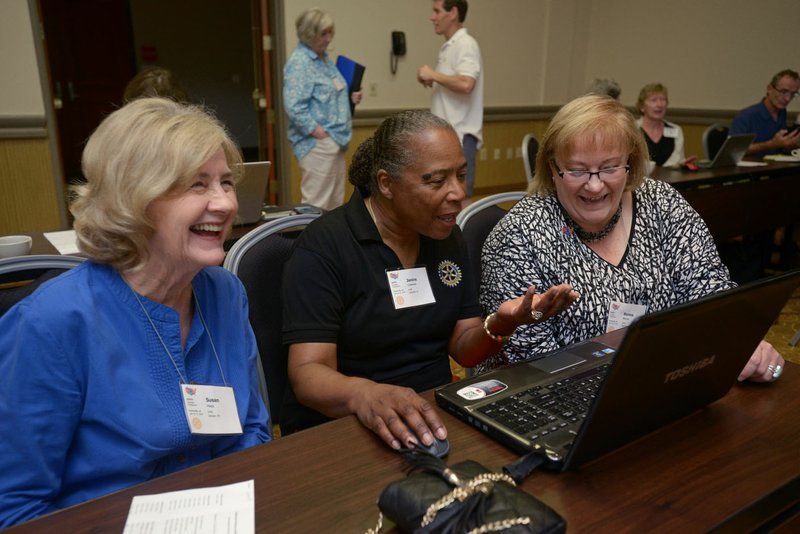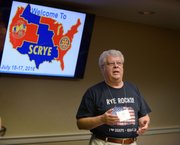BENTONVILLE -- It's difficult for Rachel Trimble to put into words her experience with Rotary International's Youth Exchange program.
Trimble was 17 when she left Spiro, Okla., -- a small town about 20 miles west of Fort Smith -- to spend the 2000-2001 school year in Nagpur, India.
Fast facts
The first Rotary Club was founded in February 1905 by Paul P. Harris, a Chicago attorney. Harris founded the Rotary Club of Chicago as a place where professionals with diverse backgrounds could exchange ideas and form meaningful, lifelong friendships. The organization’s name came from rotating the meetings between the offices of each member.
Source: Rotary International
"It was life-changing," Trimble said.
Trimble joined several other Rotarians on Saturday for the 2016 South Central Rotary Youth Exchange conference. Held at Four Points by Sheraton, the three-day event offered specialized training sessions for Youth Exchange officers, according to the group's website.
The event is a good way for Rotarians interested in Youth Exchange to familiarize themselves with the program's policies, which must adhere to U.S. State Department regulations, said Mike Hamilton, president of SCRYE.
Youth Exchange functions as a study-abroad opportunity for young people, allowing them to spend anywhere from a few weeks to a full year as an international student hosted by local Rotary clubs, according to Rotary International.
The cost for Youth Exchange often is lower than similar programs because Rotary is volunteer-based, said Paul Reagan, president-elect of the North American Youth Exchange Network.
"Usually in other exchange programs there is paid administration," Reagan said. "Rotary is all volunteers. Students are hosted at no charge, given a stipend by a Rotary club, fed by the host family and immersed in that culture."
Typically, a Youth Exchange participant only is responsible for airfare, insurance, travel documents and additional spending money for travel and tours, according to the program's website.
Rotary International is a service-based organization, and Youth Exchange is one of the program's under the "Rotary umbrella," Reagan said.
Trimble's service in India included providing nutritional meals to underprivileged public school students. She said the trip exposed her to the struggles of other communities.
Several of the students had blonde hair -- a side effect of malnutrition -- before Trimble's group arrived, she said.
"We saw huge changes. It really made me see what Rotary does," said Trimble, now a high school Spanish teacher in Gilmer, Texas, and officer at her local Rotary club. "Rotary is service above self."
Experiencing a shift in consciousness is a common trait among participants in the Youth Exchange program.
When Erin Garcia left for Austria, she returned to the U.S. "much more focused on what I wanted to do at university."
"Seeing the world from a new perspective, understanding how much more is out there, changed my life in many ways," said Garcia, responsible officer for SCRYE. "To know that I've played a small but significant part in helping eradicate polio or help put in water projects in Africa for communities that didn't have water ... those are things I know I couldn't do myself. But being part of Rotary, I can still make that happen."
Like Trimble, Garcia struggled to verbalize her experiences in Rotary. But she said the experience was "enlightening."
"I have a better sense of who I am in the global context, how i fit into the world, not just my state or county," Garcia said. "I feel Rotary more than I talk about it ... I should be talking about it more, but it's hard to express sometimes."
However, future exchange opportunities are being threatened due to declining membership.
According to a 2012 study by Rotary International, membership in the U.S. and Canada declined 21 percent from 2010, dropping from 378,108 members to 299,830 in two years. The study also found that nearly 60 percent of members were between 50 and 69 years old.
Local clubs have struggled to communicate their message and lapsed in their recruiting efforts, Garcia said.
"We have a whole session going on (today) about how to market Rotary in general and how to get the word out," she said. "Rotary is one of the best kept secrets in the world."
Reagan added that Rotary could benefit from integrating itself into school curricula.
"The smartest thing would be to develop a fact- and research-based curriculum that shows young people and their parents that advantages of living in another country," Reagan said. "We know from research that it increases creativity and job opportunity. It's difficult to get that message across in a one-hour session. Start them in the eighth grade ... and they have time to digest the information."
Meanwhile, Todd Jenkins, a co-youth exchange officer with Rotary District 6110, says diversity will help revitalize sagging membership. The district covers parts of Arkansas, Kansas, Missouri and Oklahoma.
"It's unfortunate. This program can help you learn so much," said Jenkins, who spent three months Brazil as part of Youth Exchange. "Getting everyone exposed to Rotary principles, that's what really changes lives and enriches us as people."
Jenkins plans to cast a wide net in recruiting new members, something he calls "coloring the pipeline."
"First you have to invite someone to the party. But you also have to learn to let them dance how they want to dance. Diversity is the invitation but inclusion is letting them dance how they want to dance."
NW News on 07/17/2016

